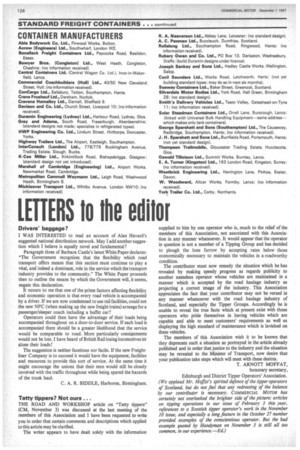LETTERS to the editor
Page 128

If you've noticed an error in this article please click here to report it so we can fix it.
Drivers' baggage?
I WAS INTERESTED to read an account of Alan Havard's suggested national distribution network. May I add another suggestion which I believe is equally novel and fundamental?
Paragraph three of Barbara Castle's latest White Paper declares: "The Government recognizes that the flexibility which road transport offers means that this section must continue to play a vital, and indeed a dominant, role in the service which the transport industry provides to the community." The White Paper proceeds then to outline the means by which the Government will, it seems, negate this declaration.
It occurs to me that one of the prime factors affecting flexibility and economic operation is that every road vehicle is accompanied by a driver. If we are now condemned to use rail facilities, could not the new NFC (when making up the new freight trains) arrange for a passenger/sleeper coach including a buffet car?
Operators could then have the advantage of their loads being accompanied throughout on a door-to-door service. If each load is accompanied there should be a greater likelihood that the service would be comparable to road. More particularly consignments would not be lost. I have heard of British Rail losing locomotives let alone their loads!
The suggestion is neither facetious nor-facile. If the new Freightliner Company is to succeed it would have the equipment, facilities and resources to provide this sort of service. At the same time it might encourage the unions that their men would still be closely involved with the traffic throughout while being spared the hazards of the trunk haul.
C. A. R. BIDDLE, Harborne, Birmingham.
Tatty tippers? Not ours...
THE ROAD AND WORKSHOP article on "Tatty tippers" (CM, November 3) was discussed at the last meeting of the members of this Association and I have been requested to write you in order that certain comments and descriptions which applied to this article may be clarified.
The writer appears to have dealt solely with the information
supplied to him by one operator who is, much to the relief of the members of this Association, not associated with this Association in any manner whatsoever. It would appear that the operator in question is not a member of a Tipping Group and has decided to plough the lone furrow by accepting rates below those economically necessary to maintain the vehicles in a roadworthy condition.
The contributor must now remedy the situation which he has revealed by making speedy progress as regards publicity to another nameless operator whose vehicles are maintained in a manner which is accepted by the road haulage industry as projecting a correct image of the industry. This Association appreciates the fact that your contributor may not be versed in any manner whatsoever with the road haulage industry of Scotland, and especially the Tipper Groups. Accordingly he is unable to reveal the true facts which at present exist with those operators who pride themselves in having vehicles which are capable and able to meet customers' requirements as well as displaying the high standard of maintenance which is lavished on these vehicles.
The members of this Association wish it to be known that they deprecate such a situation as portrayed in the article already published and in order that justice to the industry and the situation may be revealed to the Minister of Transport, now desire that your publication take steps which will meet with these desires.
T. ARNOTT MOFFAT, honorary secretary, Edinburgh and District Tipper Operators' Association. (We applaud Mr. Moffat's spirited defence of the tipper operators of Scotland, but do not feel that any redressing of the balance by our contributor is necessary. COMMERCIAL, MOTOR has certainly not overlooked the brighter side of the picture: articles on tipping operations in our issue of February 3 this year, references to a Scottish tipper operator's work in the November 10 issue, and especially a long feature in the October 27 number provided examples of the conscientious operator. But the bad example quoted by Handyman on November 3 is still all too common, in our experience.—Ed.)




























































































































































































